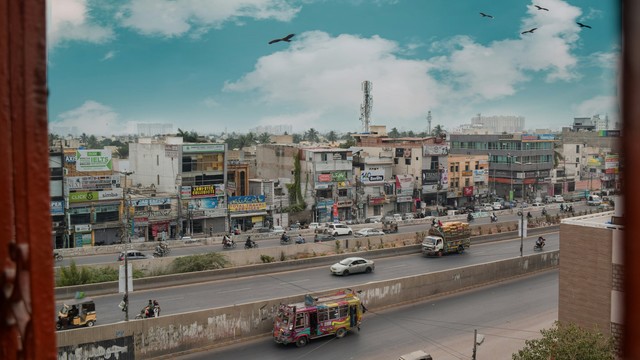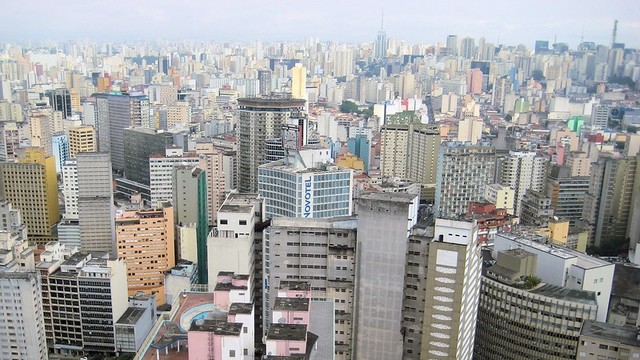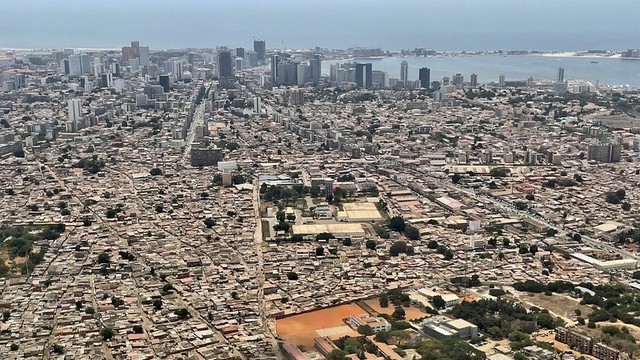Learning from each other: community groups share experiences across continents
The methodology designed by a women-led social movement from the global South has enabled tower-block tenants in inner-city Manchester to address health and social inequalities.


A community group from Manchester and members of Kenyan SDI affiliate, Muungano Wa Wanavijiji, learning from each other (Photo: copyright Community-Led Action and Savings Support)
Although SDI (Slum Dwellers International) is primarily known for its work organising and mobilising women in informal settlements in Africa and Asia, its ideas are being take up in disadvantaged and marginalised neighbourhoods in the global North. For the last three years, women-led neighbourhood groups in Manchester, and now Sheffield, have been using SDI-inspired methods to great effect.
As well as working in partnership with IIED over many years, SDI community leaders have been teaching SDI’s masters students at the Global Development Institute, University of Manchester since 2011. As the ethos of the movement is community-to-community learning, visiting SDI members were keen to meet local community organisations to learn about their experiences.
In March 2016 the exchanges catalysed something exciting and transformative with the first SDI-style savings group in Manchester, organised by the Mums Mart community association. Others soon followed inspired by a series of international visits from local community leaders – first the South African SDI alliance, and then the Kenyan SDI affiliate and mentor federation Muungano Wa Wanavijiji.
Six years later, and despite hurdles presented by the pandemic, there is a network of five neighbourhood-based Community Savers groups in the area, supported and facilitated by Community Led Action and Savings Support (CLASS).
What has been achieved so far?
Community Savers groups made amazing progress supporting their communities throughout the pandemic, developing poverty reduction projects and innovations. They developed new visions and partnerships to address the long-term disadvantage experienced in some of the lowest-income neighbourhoods.
One of the most exciting of these new partnerships is the ‘Ageing Well in Place in Hulme’ initiative (an area of inner-city Manchester). It brings together tenants, their housing provider (One Manchester), local voluntary and community sector organisations and two universities to devise solutions for the elderly and vulnerable tower block residents of the Aquarius estate.
The impact has been so profound that one of the leading tenants’ group, Aquarius Community Savers, recently received the University of Manchester’s ‘Making a Difference’ award.
How we worked – after some persuasion…
The idea was to adapt the idea of mapping/enumeration and profiling techniques from the SDI toolkit for our own group, and this had to be done very sensitively.
When I first came into contact with Community Savers, I had already been active in the community for 30 years from being employed as a youth worker, social worker, women’s support officer and in many voluntary roles.
Over time, I learned that if I tell my truth and my community’s truth through art, people are more likely to accept what I’m saying. I published a poetry collection called ‘Classphemy’, wrote a play ‘Can you hear me from up here?’ (through the On Top of the World project), and set up two writing groups.
These creative activities focus on speaking truth to power about the negative impact of inner-city redevelopment, including that of the university, and gentrification on my community.
I was therefore conflicted when approached by Sophie King (director of CLASS), and who was at the time a university academic, to participate in a gathering called ‘inner-city exchange’. Universities had lots of negative connotations in my community as their expansion had taken land where we used to have social housing and community facilities.
Recognising my scepticism Sophie arranged for Sharon Davis, a representative from a Community Savers group, to explain how they operate and reassure me that I wasn’t dishonouring my community by participating.
Sharon had learned from community activists in South Africa and Kenya. It all made sense – it was much more than a savings group. It’s a social movement run by women not so different from me.
I, like every woman on the planet, know that the personal is the political. Every penny saved is an act of resistance and challenge to those who control our lives worldwide. It was impossible not to want to be a part of something so amazing!
Call to action – inspiration from Kenya
I was so impressed when I met Anastasia Wairimu, a lifelong leader of the movement in Kenya, who came to visit in 2019. It made me realise just how big the movement is – and how organised they were. Anastasia described how the movement worked, with women finally getting their own homes constructed, getting roads built, getting electricity and water.
It inspired us when she talked about collecting information as evidence to bring to the authorities. Although we lived worlds apart, we were together in resisting inequality, and understanding that working together as women, we can bring change.
Inspired by Anastasia’s visit, and together with ‘On Top of the World’ where we run a weekly drop-in with older tenants, we considered issues facing our community and particularly those living in my block, Hopton Court, where 75% of residents are aged 50 and over.
We knew that many were in vulnerable or difficult circumstances and often had poor health but were not receiving the care they needed. We were aware that some were hiding their frailty for fear of being moved away from the place they call home. Many felt isolated and there was nowhere for us to come together during the pandemic.
Research with a difference
Supported by CLASS, local universities and One Manchester, we undertook initial interviews with tenants and others to get an overview of some of the challenges tenants were facing.
More in-depth work, including a tenant-led survey of our whole block, was possible with social responsibility funding and support from a PhD researcher at the University of Manchester, Whitney Banyai-Becker.
This was different to other research projects I’ve been involved in because the questions were designed by the tenants themselves. We felt ownership of the project and shared our expertise about how to approach our neighbours, what would be needed to encourage their participation, and also about safety and protecting people’s privacy and confidentiality – we know our own community well and we knew what people’s concerns would be.
Whitney and Sophie ensured information was recorded systematically, surveys were written up and analysed, and that outputs were clear and comprehensive.
We asked residents what practical changes they would like to see, but also covered wider areas such as access to services, social isolation, health and wellbeing, and feelings of connectedness. It wasn’t easy but once people realised we were their own neighbours, they were willing to engage. The response rate of over 50% far exceeded our expectations.
Being tenant-led gave us the drive and motivation to do right by our neighbours. And it gave me and other residents something we had not had before – hope. I felt Anastasia and all the African sisters with me and this gave me strength.
Positive changes
Since doing the survey, life has completely changed at Hopton Court. We’ve formed a steering group to establish something called a ‘Naturally Occurring Retirement Community’ (NORC) at ours and neighbouring blocks. We have a full-time independent living advisor who ensures that older tenants have access to the support and services they need to ‘age well in place’, and a development worker will help make our retirement community idea a reality.
An age-friendly community facility is going to be constructed in our shared garden area, so that we’ll always have somewhere to socialise and access information and support – even in the winter when it’s too cold to sit outside. Places like this have been lost to regeneration and university expansion, so it will be good to bring something new which will be really valued by older people locally.
We’ve been working on this initiative for over two years now – learning, planning, designing, getting to trust the process and to trust ourselves, and realising what is possible and achievable.
But the path to change does not (always) run smooth
Trust
At times it’s been an uncomfortable cultural shift for One Manchester to learn to trust and work with us tenants as equal partners. From the residents’ side, we have learned to trust, respect and work with them in a way that just wasn’t there before. But trust is fragile and will always need work to maintain it.
I think every person needs to learn how power structures work. Now when I’m working in the community, if something is not as it should be, I won’t hesitate to take it higher – you may have to work around those who may not understand what you are trying to achieve.
You can’t work upwards through straight lines – sometimes you need to go backwards or press pause before you can go forwards again.
Pride
I am proud of my community for being part of these changes. I’m most proud of being part of Community Savers because I know I’m in a movement based on social justice. It’s also the place I’ve been challenged the most, but also learned the most.
In November, I will be visiting Anastasia and other Muungano Wa Wanavijiji members together with some of the other Community Savers leaders. I am so excited to finally get to Kenya to meet the women I have been working closely with and learn from them, while being able to share our learning from Hulme.
I want to see how they carry out collections, what women are saving for, and the amazing changes that they are bringing for their own communities.
This blog was originally posted on the Global Development Institute (GDI) website.



